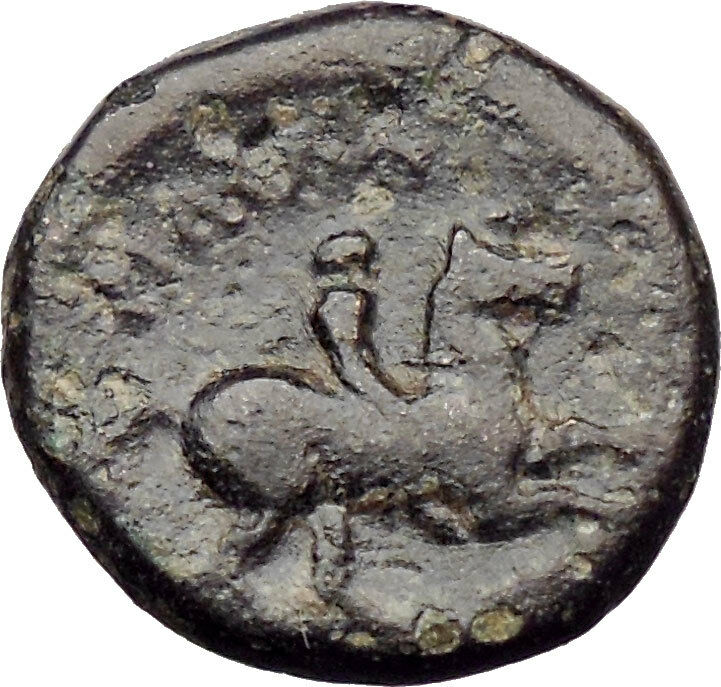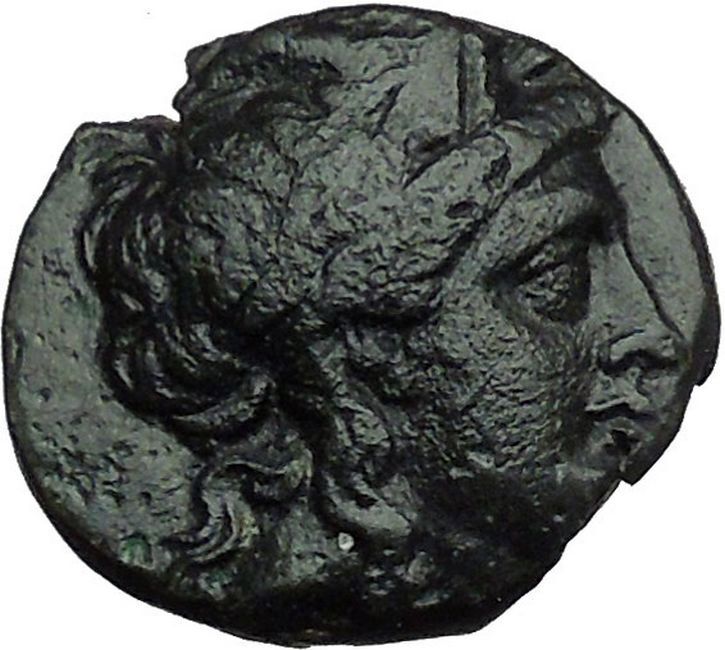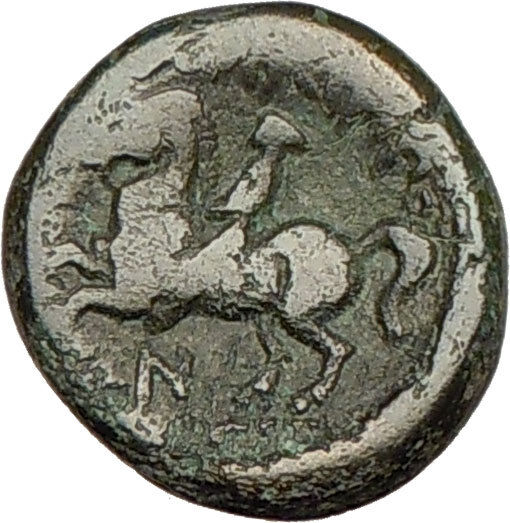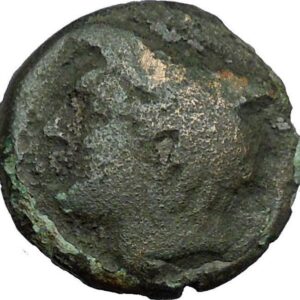|
Greek coin of
Seleukid Kingdom
Antiochos VIII Grypos – King: 121-96 B.C.
Bronze 14mm (3.06 grams) Antioch mint, struck circa 121-114 B.C.
Reference: HGC 9, 1220; Sear 7158
Bust of Artemis right, quiver over shoulder.
ΒΑΣΙΛΕΩΣ ANTIOXOY / ΕΠΙΦΑΝΟΥΣ,
Apollo standing left, holding arrow and grounded bow; Seleukid date in exergue.
You are bidding on the exact item pictured,
provided with a Certificate of Authenticity and Lifetime Guarantee of
Authenticity.
Artemis was one of
the most widely venerated of the Ancient Greek deities. Some scholars believe
that the name, and indeed the goddess herself, was originally pre-Greek. Homer
refers to her as Artemis Agrotera,
Potnia Theron
“Artemis of the wildland,
Mistress of Animals”. In the classical period of
Greek mythology
, Artemis (Greek:
(nominative)
Ἄρτεμις, (genitive)
Ἀρτέμιδος) was often
described as the daughter of
Zeus and Leto
, and the twin sister of
Apollo
. She was the Hellenic goddess of the
hunt, wild animals, wilderness, childbirth, virginity and young girls, bringing
and relieving disease in women; she often was depicted as a huntress carrying a
bow and arrows. The deer
and the
cypress
were sacred to her. In later
Hellenistic times, she even assumed the ancient role of
Eileithyia
in aiding childbirth.
Artemis later became identified with
Selene
, a
Titaness
who was a Greek moon goddess,
sometimes depicted with a crescent moon above her head. She was also identified
with the Roman goddess
Diana
, with the
Etruscan
goddess
Artume
, and with the Greek or
Carian
goddess
Hecate
.

In
Greek
and
Roman mythology
,
Apollo, is one of the most
important and diverse of the
Olympian deities
. The ideal of the
kouros
(a beardless youth), Apollo has been
variously recognized as a god of light and the sun; truth and prophecy;
archery
; medicine and healing; music, poetry,
and the arts; and more. Apollo is the son of
Zeus and Leto
, and has a
twin
sister, the chaste huntress
Artemis
. Apollo is known in Greek-influenced
Etruscan mythology
as Apulu. Apollo was
worshiped in both
ancient Greek
and
Roman religion
, as well as in the modern
Greco
–Roman
Neopaganism
.
As the patron of Delphi
(Pythian Apollo), Apollo was an
oracular
god — the prophetic deity of the
Delphic Oracle
. Medicine and healing were
associated with Apollo, whether through the god himself or mediated through his
son Asclepius
, yet Apollo was also seen as a god
who could bring ill-health and deadly
plague
as well as one who had the ability to
cure. Amongst the god’s custodial charges, Apollo became associated with
dominion over
colonists
, and as the patron defender of herds
and flocks. As the leader of the
Muses (Apollon Musagetes) and director of their choir, Apollo
functioned as the patron god of music and
poetry
.
Hermes
created the
lyre for him, and the instrument became a common
attribute
of Apollo. Hymns sung to Apollo were
called paeans
.
In Hellenistic times, especially during the third century BCE, as Apollo
Helios he became identified among Greeks with
Helios
,
god of the sun
, and his sister Artemis
similarly equated with
Selene
,
goddess of the moon
. In Latin texts, on the
other hand, Joseph Fontenrose declared himself unable to find any conflation of
Apollo with
Sol
among the
Augustan poets
of the first century, not even
in the conjurations of
Aeneas
and
Latinus
in
Aeneid
XII (161–215). Apollo and Helios/Sol
remained separate beings in literary and mythological texts until the third
century CE.
Antiochus VIII Epiphanes/Callinicus/Philometor, nicknamed Grypus
(hook-nose), was crowned as ruler of the
Greek
Seleucid kingdom
in 125 BC. He was the son of
Demetrius II Nicator
and
Cleopatra Thea
.
Biography
Antiochus Grypus was crowned as a teenager in 125 BC after his mother
Cleopatra Thea
had killed his elder brother
Seleucus V Philometor
, ruling jointly with her.
After Antiochus defeated usurper
Alexander II Zabinas
in 123 BC his mother tried
to poison him with wine, but the suspicious king forced her to drink the cup
herself. (The story may have been inspired by the fact that Grypus was
interested in toxicology; some poems about poisonous herbs believed to have been
written by him are quoted by the famous physician
Galen
).
Either he or his half brother
Antiochus IX Cyzicenus
is probably identical
with the ephemeral child ruler Antiochus Epiphanes, who was crowned by
Cleopatra Thea
after the death of Antiochus VII
but before Demetrius II returned to Antioch. The child Antiochus Epiphanes, who
is known from coins, was deposed—but not killed—when Demetrius II was restored
in 129 BC.
Coin of Antiochus VIII Grypus. Reverse: god
Sandan
standing on the horned lion,
in his pyre surmounted by an
eagle
.
Despite political shortcomings, Grypus was a popular king. His ugly, lazy
appearance on coins (common among the last Seleucids), together with stories of
his lavish banquets, made posterity believe his dynasty was degenerated and
decadent. This was however a conscious image, an invocation of the Hellenistic
idea Tryphe
– meaning good life, which the last
Seleucids strove to be associated with, as opposed to the exhausting civil wars
and feuds which troubled their reigns in reality.
A story of his luxurious parties claims he sent food home with guests who
attended banquets, complete with a camel as beast of burden, as well as a with
attendant to carry the guest himself. This should certainly have caused some
strain on the already depleted treasury.
Family
He married the
Ptolemaic
princess
Tryphaena
, but in 116 BC his half-brother and
cousin
Antiochus IX Cyzicenus
(see
Antiochus VII Sidetes
) returned from exile and
a civil war
began. Cyzicenus’ wife, also named
Cleopatra
, was a sister of Tryphaena and was
eventually killed in a dramatic fashion in the temple of
Daphne
outside
Antioch
, on the order of Tryphaena. Cyzicenus
eventually killed Tryphaena as revenge. The two brothers then divided
the Seleukid Kingdom
between them until Grypus
was killed by his minister Heracleon in 96 BC.
Five of Grypus’ sons later rose to kingship:
-
Seleucus VI Epiphanes
-
Antiochus XI Ephiphanes Philadelphus
-
Philip I Philadelphus
-
Demetrius III Eucaerus
-
Antiochus XII Dionysus
This contributed to the confusion of civil war amid which the Seleucid empire
ended.
He also had at least one daughter:
-
Laodice VII Thea
, married to king
Mithridates I Callinicus
of
Commagene
as part of a settlement by
Mithridates’ father
Sames II Theosebes Dikaios
to ensure peace
between the Kingdom of Commagene and the
Seleucid Empire
. Laodice and Mithridates’
son was king
Antiochus I Theos of Commagene
. This was a
grandson to Grypus.
Seleucid
Empire
Σελεύκεια
Seleúkeia |

|
312 BC–63 BC |
↓
|
|
|
The Seleucid Empire in 301 BC.
|
The Seleucid Empire
was a
Hellenistic
state ruled by the Seleucid dynasty
founded by
Seleucus I Nicator
following the division of
the empire created by
Alexander the Great
. Seleucus received
Babylonia
and, from there, expanded his
dominions to include much of Alexander’s
near eastern
territories. At the height of its
power, it included central
Anatolia
, the
Levant
,
Mesopotamia
,
Kuwait
,
Persia
,
Afghanistan
,
Turkmenistan
, and northwest parts of
India
.
The Seleucid Empire was a major center of
Hellenistic
culture that maintained the
preeminence of
Greek
customs where a Greek-Macedonian
political elite dominated, mostly in the urban areas. The Greek population of
the cities who formed the dominant elite were reinforced by emigration from
Greece
. Seleucid expansion into
Anatolia
and Greece was abruptly halted after
decisive defeats
at the hands of the
Roman army
. Their attempts to defeat their old
enemy
Ptolemaic Egypt
were frustrated by Roman
demands. Much of the eastern part of the empire was conquered by the
Parthians
under
Mithridates I of Parthia
in the mid-2nd century
BC, yet the Seleucid kings continued to rule a
rump state
from
the Seleukid Kingdom
until the invasion by
Armenian
king
Tigranes the Great
and their ultimate overthrow
by the Roman
general
Pompey
.
|












